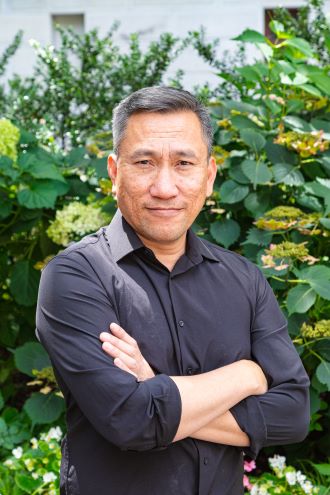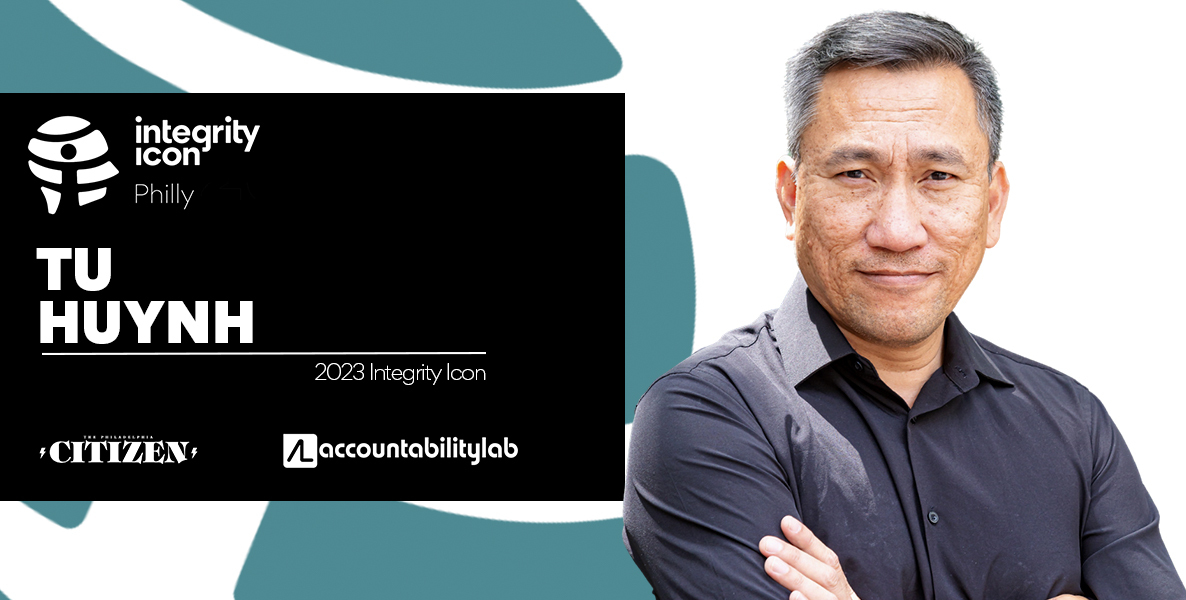This profile is part of a series spotlighting the five winners of the 2023 Integrity Icon Award, a collaboration with Accountability Lab to “name and fame” City of Philadelphia employees who demonstrate the highest integrity in their work. Read all five profiles here.
Tu Huynh calls encounters between art and people in City Hall “random acts of culture.” The program manager for the Office of Arts, Culture and the Creative Economy has not curated but “facilitated” — another term he prefers — more than 300 exhibitions since he started working for the City in 2003. He also refers to City Hall as “the people’s building.”
Every time a work of art appears in the building’s first- or fifth-floor display cases, the Mayor, City Councilpeople, police officers, marriage license seekers, town hall attendees, conventioneers, international tourists, school groups and Philadelphians from every walk of life — many not typical art museum-goers — will see it. This makes the encounters random. But the culture is anything but.
For his humility and creativity, his ability to bring disparate groups together, inspiring artists and viewers, in unexpected ways, and his dedication to making Philadelphians see reflections of themselves within a grand space that should belong to us, Tu Huynh is being honored as one of five Integrity Icons for 2023.
“Tu takes the responsibility of bringing community voices directly into confrontation with powerful elected officials,” says Kelly Lee, Director of Arts, Culture and the Creative Economy (and Huynh’s boss).

“These are all stories.”
Born in Vietnam and raised in Miami, FL, the Germantown resident had worked as a professional artist and arts educator before coming to town. His first Philly gig? The gift shop at the African American Museum in Philadelphia. He’d go on to become a curator there.
When he got the job in City Hall — his title and responsibilities have changed over the years, but basically, he’s always been in charge of the art onsite — Huynh admired the juried pieces that came and went from the building’s display cases every few months. (Former City Councilmember Joan Specter created the program.)
But the artwork missed something fundamental. “We’re a city government. We have a responsibility to everyone,” says Huynh. His challenge: “How can we make it more than that? Art is in hospitals, in prisons, in homeless shelters and transitional housing, on the street. These are all stories, and all this work is relevant.”
His solution: Go to the people. Meet with school groups, nonprofits, and artist groups, including those hosting national conferences for, say, Latino arts, Jewish artists, book illustrators, or mosaic makers nearby. Go to prisons — notably, Graterford, before it closed — to get to know the prisoners and their art. Talk to people who’ve experienced gun violence, hunger, homelessness, and joy. Listen to real Philadelphians, learn their stories, and help them show their stories to the people. Sound like a daunting task? It is.
“Saying The arts are for everyone sounds like a really nice talking point,” Huynh says. “But I believe it.”
Greta Greenberger, beloved longtime director of tours at City Hall (now retired), had a close-up view of her colleague’s progress. “Tu has taken the Art in City Hall program so much further than what it was originally created to be,” she says. “He opened it up to the community.”
Sometimes, Huynh says, this process is straightforward, “organic.” Other times, it requires working with groups that don’t necessarily get along, bringing them together for social practice, or cultural organizing. A request from one city leader to display old banners from Pennhurst State School and Hospital led Huynh to organize not only a large exhibit by artists with disabilities, but also a disability march. He once hosted a reception for self-taught Philadelphia artists with histories of homelessness and addiction with recent graduates of PAFA, Tyler, Penn, U Arts — all of whom had work on exhibits in City Hall. What ensued was “was some of the most incredible conversations you can imagine,” he recalls.
“Tu listens to people,” says Diane Turner, curator of the Charles L. Blockson Afro American Collection at Temple University. “He truly works for the community, well outside business hours.”
Huynh is one of five 2023 Integrity Icons, the latest winners in a contest the Citizen has run in partnership with the Washington, D.C.-based Accountability Lab since 2020. The goal of the program: To hold up the city workers who model how we can all go above-and-beyond to make a positive impact in Philadelphia.
This past spring, the public nominated dozens of excellent city workers for the award, using the following criteria: They are a high-integrity public service employee who is respectful and caring; know their work makes a difference to people’s lives; act in a trustworthy and transparent way to solve problems the best they can; treat everyone equally, without regard to politics or influence; and go above and beyond to provide good service to Philadelphians.
A panel of high-integrity judges reviewed the candidates, and selected this year’s honorees. The judges included 2020 Integrity Icon Richard Gordon IV, assistant superintendent of the School District of Philadelphia who spent years as principal of Paul Robeson High School; 2022 Integrity Icon Rebecca Lopez Kriss, a deputy commissioner in the City’s Revenue Department; Angela Val, president and CEO of Visit Philadelphia; Amy Kurland, former Inspector General of the City of Philadelphia; and SEAMAAC Executive Director Thaoi Nguyen.
“Tu listens to people,” says Diane Turner, curator of the Charles L. Blockson Afro American Collection at Temple University. “He truly works for the community, well outside business hours.”
“Art needs to be here.”
At one point, Huynh was organizing 20 to 25 exhibits annually. These days, it’s more like three or four per year, one per season. On display right now: a historic perspective on Bella Vista’s Fleisher Art Memorial and some remaining pieces from The Apologues, artistic remembrances of Philadelphians lost to gun violence. He’s also displayed work from the Souls Shot Portrait Project.
Lately, however, his job has consisted more of visually representing citywide flashpoints — 2022’s tragic house fire in Fairmount, for example, and, coming up next, an exhibit on the MOVE bombing. These assignments require both the utmost sensitivity and the ability to merge history and art in a display that’s thoughtful and compelling. He feels like he cannot let anyone down.
“Your credibility has to be earned, and it has to be earned continuously,” says Huynh. “So much of government is about power. I don’t want that power. I want to use it and spread it out. This baffles people. But for the past 20 years, I’ve gone this route. I include what people think, even though it would be easier if I did it myself.” His approach: “Invite artists in. Give them a seat at the table. Let’s explore how we can present issues.”
Through it all, he’s been a one-man team. He shares the office, just off the building’s northeast entrance, with employees from Public Art, who oversee the City’s Percent for Art mandate, collaborate with ReBuild on projects, and look after hundreds of sculptures and statues in our city.
Huynh doesn’t know of another city with thought-provoking art exhibitions inside its main municipal building. Tourists whom he encounters frequently stop him to ask how they get the same program in their own city hall. “I always explain to them how it began here, and why it’s important to have this representation, right here in this building,” he says.
Huynh is glad, he says, to give all kinds of visitors impromptu tours, even when he’s there working on weekends. But he sees his mission as, first and foremost, for the people of Philadelphia. “I want people to leave here with the understanding that this place is not a private gallery,” he says. “This is City Hall. Administrators come and go. But this building belongs to everyone, and that’s what’s important. Art needs to be here. It’s about representation, your voices. This is a platform for you.”
Integrity Icon Philadelphia is made possible in part thanks to the generous support of Thomas Skelton Harrison Foundation.
![]() MEET OUR 2023 INTEGRITY ICON WINNERS
MEET OUR 2023 INTEGRITY ICON WINNERS



